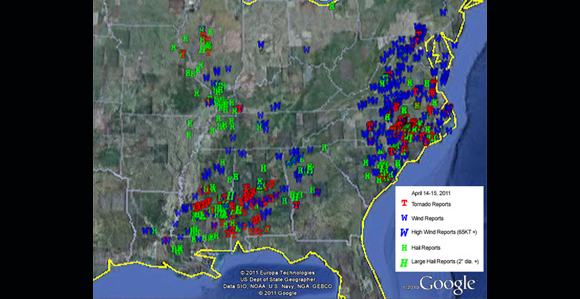Members in North Carolina Relate Experiences During, After Tornadoes
Contributed By Heather Wrigley, Church News and Events

Article Highlights
- More than 200 severe tornadoes and thunderstorm were reported in two days across the southeastern United States.
- Within hours, teams of members were organized to clean up throughout their communities.
- Church leaders are coordinating relief and clean up efforts with VOAD, the Red Cross, and other agencies.
"We have one purpose, and that’s to serve the Lord Jesus Christ and to help our fellow man." —Joseph N. Catlett Jr., Fayetteville North Carolina Stake president
Related Links
VIDEO ADDED 4/22/11—Six days after violent tornadoes battered the southeastern United States, stories of members’ experiences and the service that has been given since the disaster are surfacing.
On April 14 and 15 more than 200 severe tornadoes and thunderstorms moved through several southern and southeastern states. Some 90 storms struck North Carolina alone.
All members and missionaries are safe and accounted for. Two member homes in the Fayetteville North Carolina Stake and one member home in the Chesapeake Virginia Stake were destroyed.
The heaviest damage occurred in North Carolina, Virginia, Alabama, and Mississippi. Nearly 50 people have been confirmed dead, and more than 100 others have been reported injured. Hundred of homes were damaged or destroyed and thousands are without power.
Within the boundaries of the Chesapeake Virginia Stake, 10 members of the community lost their lives. In the member home that was destroyed, the grandmother, mother, and two daughters were at home when the house was hit. As they huddled together in the bathroom the roof of the house was ripped off, but they were not harmed.
Stake president Michael M. Dudley said a call was put out to stake members to donate furniture and other necessities the family lost in the disaster.
“It looks like in a few days they may have everything they’ll need,” he said. “The members and Church leaders have responded quickly.”
The local Relief Society is also helping those in need by distributing hygiene kits the sisters had stored to members and others in the community.
Fayetteville, North Carolina, was the heaviest hit. The area was under tornado watch, but no one expected a storm of such magnitude.
Joseph N. Catlett Jr., Fayetteville stake president, was standing outside his home at 4:15 p.m. on Friday afternoon.
“I could see the wind swirling in different directions, and then things got real quiet,” he said. The tornado missed his home by about two miles (3 km), but he, like most of the city, lost power.
The F3 tornado cut a 10-mile-long (16 km) swath of destruction, in some places a mile (1.6 km) wide. Winds of 150 miles an hour (240 km/h) snapped trees in half, tore roofs off homes, and scattered debris everywhere.
Luckily, most people were inside when the tornado touched down due to the bad weather.
On the first night a crew of some 15 Church members removed downed trees with chainsaws and covered roofs with tarps for hours until curfew. Dozens returned the next day to various areas to help patch up homes and clean yards.
“As we went about cleaning, people saw us and asked if we could help them,” President Catlett said. “We realized we needed to mobilize the stake to go out and help our friends and neighbors.”
Within an hour of the call to help, more than 250 men, women, and children gathered to work and help recover and reclaim.
“They were calling us the Mormon army,” President Catlett said. “People were so sincere and grateful.”
On Monday members gathered in Cottonade, a subdivision in Fayetteville known for its heavy growth of pines. The trees became dangerous projectiles in the tornados’ high winds. Limbs and rubble were scattered over several blocks, and houses and cars were split in half.
“There’s still so much to do,” said Bob Hales, a member of the Hope Mills First Ward. “But if we pull together like we did today, we’ll be the stronger for it.”
Stephen Sanders, a long-time Fayetteville resident and member of the Fayetteville Fourth Ward, agreed. “It feels good to help, especially these folks who are hurting so badly,” he said. “The look of gratitude in their eyes makes it all worth it.”
Members in yellow Mormon Helping Hands vests continue to assist other members and neighbors in recovery efforts—covering gaping roofs, cleaning yards, and salvaging belongings from piles of debris.
Local priesthood leaders are working closely with religious, civic, and government agencies to evaluate needs and determine how the Church may continue to provide resources and volunteers.
President Catlett quoted Matthew 22:37–39: “Thou shalt love the Lord thy God with all thy heart, and with all thy soul, and with all thy mind. This is the first and great commandment. And the second is like unto it, Thou shalt love thy neighbour as thyself.”
“This whole Church, we have one purpose, and that’s to serve the Lord Jesus Christ and to help our fellow man,” he said. “Our members are living those commandments. It’s given me strength to see so many good people.”
The recovery is expected to take months and will require many more hands. On Tuesday, the Church began taking steps to work closely with local emergency management services, the city of Fayetteville, Voluntary Organizations Active in Disaster (VOAD), the American Red Cross, and other agencies to begin to assess needs and develop a plan to sustain a larger group of people for a longer period of time. The scope of recovery and restoration efforts will widen, probably involving people from surrounding areas of the state.
“We’re seeing other people who have great desire to give, who have the same passion to love the lord and their fellow man,” President Catlett said. “We’re bruised, but we’re not beaten. We’ll continue to rebuild and get stronger.”

